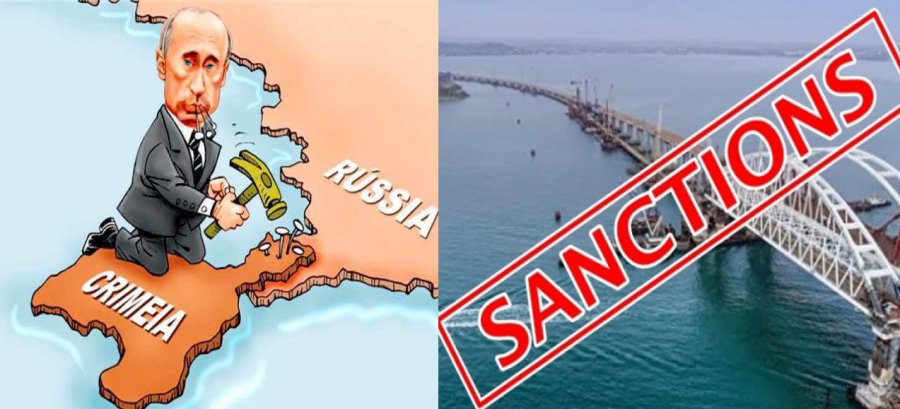Russia forced to ‘change the status’ of occupied Crimea because of sanctions

Russia is reportedly planning a new ‘legal regime’ for illegally occupied Crimea in a desperate attempt to entice investors. The proposed ‘special legal region’ will offer Russian companies secrecy about any work in Crimea in order to avoid international sanctions. As political analyst Vitaly Portnikov notes, this is effective admission that, seven years after its invasion and annexation, occupied Crimea remains toxic not only for western investigators, but also for Russian business.
RBC reported on 3 February that Russia’s Ministry of Economic Development has drawn up a draft bill on a special legal regime, enabling Russian investors to keep any business and property in occupied Crimea secret. The so-called ‘special legal region’ would thus be an attempt to deceive western countries and avoid sanctions. The new measure would be in addition to the current so-called ‘free economic zone’ imposed in late 2014.
Although certain companies, most notoriously Siemens, have used deception to bypass sanctions, there is an effective US trade embargo against any business while Crimea is under Russian occupation. The sanctions imposed by the USA in 2014 also empower the US authorities to impose sanctions against any Russian companies doing business in Crimea. RBC names several Russian companies that have already been sanctioned and points out the EU also imposed sanctions against companies involved in building the illegal Crimean bridge between Kerch in Crimea and Russia.
The problem is, however, that thus far US and European authorities have been guided by public communications and about information on Russian state registers. It is all of this that Russia is proposing to now make totally secret, with this an effective carte blanche, not only for violating international law, but also for rampant corruption.
Most Russian companies will not work in occupied Crimea out of fear of sanctions. Virtually the entire construction of the Kerch Bridge went to a firm owned by Arkady Rotenberg, a crony of Russian President Vladimir Putin. Rotenberg and his firms have been under sanctions since 2014 and had nothing to lose. Even if the Crimea bridge, with its lack of any financial controls or limits, did not make a huge profit, Rotenberg would have been ‘compensated’ with plenty of other lucrative money-spinners. There was trouble even insuring the construction of the bridge, let alone the bridge itself, which is not only illegal, but very likely to collapse because of the poor geological conditions in the area.
RBC says that it has seen both the new draft bill and explanatory note to it. Neither says anything about western sanctions, but does offer secrecy of information about the investor. The ministry itself is not particularly concealing that the main objective is to avoid sanctions with a spokesperson confirming to RBC that the so-called ‘special administrative regions (Crimea, and, separately, the city of Sevastopol).would be attractive to Russian investors because they reduced the risk of facing sanctions, as well as because of tax incentives.
Portnikov calls the move not only acknowledgement that occupied Crimea is “toxic territory” even for Russian investors, but also admission that almost seven years after Russia’s invasion, Crimea remains outside Russia’s legal boundaries. As Portnikov has stressed since 2014, Crimea was always organically linked with Ukraine. This is the reason why occupied Crimea is now facing real water supply problems and environmental dangers. As Portnikov says, “this is geography which neither a decree from Russia’s President nor the Crimean bridge, can change”.
Russia stubbornly tries to treat Crimea as ‘any other part of the Russian Federation’. “Before enticing Russian businessmen into ‘special regions’, the Kremlin should explain why on the peninsula you won’t find any Russian state companies - not the Russian railway, not the Russian Post Office, or Sberbank – nobody, virtually nobody!, Portnikov writes.
It remains to be seen whether Russia does go ahead with this effective admission that sanctions are hurting, and that Crimea is not part of Russia. If it does, it may be harder to track down individual sanction-breakers, but should not be impossible, and any company doing business with illegally occupied Ukrainian territory will hopefully still face sanctions.





